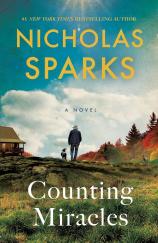Excerpt
Excerpt
Counting Miracles

Chapter One
March 2023
Tanner Hughes stepped onto the porch of the cottage that had once belonged to his grandparents and locked the door behind him. In one hand, he held a duffel bag, in the other a garment bag protecting the suit he’d worn to his grandmother’s funeral five weeks earlier.
He looked up, noting a single cloud glowing brilliant white in the morning sunshine. It would be another postcard-perfect Florida day and he thought again that his grandparents had chosen a nice place to settle down for good. Pensacola had always been a military town and many veterans moved to the area to retire; he suspected that his grandparents, especially his former army mechanic grandpa, had fit right in. He left the key beneath a flowerpot for the realtor, who planned to come by later. The furniture had already been moved out, painters had been scheduled, and the realtor had hinted that the place would sell quickly. Tanner had spent much of the last month sorting through his grandparents’ things and processing the final months he’d spent with his grandma.
He glanced over his shoulder one last time, missing her, missing his grandpa. His grandparents were the only parents he’d ever known, his single mother having died minutes after Tanner had been delivered. It felt strange to know they were no longer around, and the word orphaned felt apt. After all, his mother had existed for him only in photographs and until recently, he’d known nothing about his biological father at all. In their taciturn way, his grandparents had implied they hadn’t known his father’s identity, and Tanner had long ago convinced himself that it didn’t really matter. Sure, sometimes he wished he’d known his parents, but he’d been raised in a loving home, and that was all that really mattered.
Pushing his thoughts aside, he started toward his car, thinking it looked fast even while parked in the driveway. A reproduction 1968 Shelby GT500KR from Revology Cars, it was candy-apple red with Wimbledon white stripes; even though it was brand-new, it looked identical to the ones that rolled off the line more than half a century earlier. It was the most extravagant thing Tanner had ever purchased for himself, and when it had arrived, he’d wished his grandpa had been alive to see it. They’d both loved American muscle cars, and while this wasn’t an original, it was made to be driven, not stored in a collector’s garage, which suited him just fine.
Yet, come summertime, it was going to end up in a garage anyway.
Tanner squeezed the bags into the trunk next to a box of keepsakes from the cottage. His backpack was already on the passenger seat. The engine started with a throaty roar, and he headed through town, toward the interstate, passing chain stores and fast-food restaurants, thinking that aside from the beach, Pensacola didn’t strike him as all that different from other places in other states he’d visited recently. He was still getting used to the sameness in much of the United States and he wondered whether he’d ever stop feeling like a stranger in the country.
As he drove, he felt his mind drifting through the highlights of his life: a youth spent on a dozen different military bases in Germany and Italy, basic training at Fort Benning in Georgia, nearly a decade and a half in the army. The numerous deployments to the Middle East and after he left the service, his security work with USAID—the U.S. Agency for International Development—all of it spent overseas.
And since then?
He’d pretty much stayed on the move, if only because it was all he knew. Much of the last couple of years had been spent on the road, his travels taking him from one side of the country to the other. He’d filled his phone with photos of national parks and various monuments as he’d reconnected with friends and, more important, visited the families of other friends he’d known in the service who’d passed away. In all, he’d been able to name twenty-three friends who’d been killed or died by their own hand after they’d left the service. Talking with their widows or parents felt right somehow, as though he was getting closer to an answer he needed, even if he still wasn’t sure what the question might be.
Though there were a few more families on his list he intended to see, the road trip had been cut short last October, when he learned that his grandma’s time was running out. Somehow, despite their regular calls and texts, she’d neglected to mention that she’d been diagnosed with a terminal lung condition a few months earlier. He’d rushed to Pensacola, where he found her propped up in bed and attended by a caregiver. His first thought was that she seemed smaller than he remembered and her breathing was labored despite the oxygen tank, making speech slow and abbreviated. The visible reality of her condition made his stomach clench, and for the next few months, he rarely left her side. He took over much of her feeding and grooming, and often slept on a cot he’d set up in her bedroom. He made calorie-dense milkshakes and mashed her food until it was soft enough to be eaten by a baby; he tenderly brushed her thinning hair and applied balm to her cracked lips. In the afternoons, when she wasn’t sleeping, he often read to her from a poetry collection by Emily Dickinson while she focused on the view outside her window.
Because speech became more difficult for her as the weeks went on, he did most of the talking. He told her about the Grand Canyon, Graceland, an ice hotel in northern Wisconsin, and a dozen other places, hoping she’d share in his enthusiasm, but instead, the concern in her expression spoke volumes. I’m worried about leaving you behind, she seemed to be saying, your life is unsettled. When he tried to explain again that his recent travels had been a way for him to honor the friends that he’d lost, she shook her head. “You need a . . . home,” she rasped out, before succumbing to a prolonged coughing spasm. When she recovered, she motioned for him to hand her the pad of paper and pen on her nightstand. Find where you belong and make that place your own, she scrawled.
Knowing she’d be disappointed that he seemed no closer to settling down, he didn’t tell her that Vince Thomas, an old friend of his from USAID, had reached out to him in January. Vince was leaving for a new gig in Africa. They’d worked together in Cameroon before, and he’d told Tanner that he needed a deputy head of security who was familiar with the country and its politics. Tanner could remember accepting the offer, thinking at the time that it felt like as good a next step as any.
Now, back on the interstate for the first time in months, the flat countryside of northern Florida passed in a lazy blur. After a quick visit with his best friend, Glen Edwards, and his family, Tanner planned to travel to Asheboro, North Carolina, wondering what, if anything, he would find.
Asheboro.
His grandma had written the name of that small town on a notepad, not long before she lapsed into a coma.
Excerpted from COUNTING MIRACLES by Nicholas Sparks. Copyright © 2024 by Nicholas Sparks. All rights reserved. No part of this excerpt may be reproduced or reprinted without permission in writing from the publisher.
Counting Miracles
- Genres: Fiction, Women's Fiction
- paperback: 384 pages
- Publisher: Dell
- ISBN-10: 0593449614
- ISBN-13: 9780593449615


